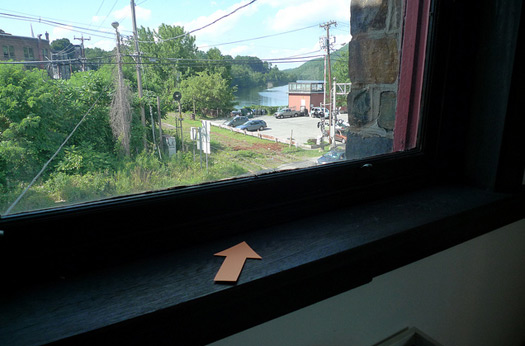
Windows at the Brattleboro Museum & Arts Center look onto the riverfront site that is the exhibition's subject. Photos: Chris Whitmore
Circle stickers have been in high demand at the Brattleboro Museum & Arts Center in Brattleboro, Vermont. Visitors to the “Renewing the Riverfront” exhibition, organized by a multidisciplinary workshop under the auspices of Marlboro College and its Center for Creative Solutions (CCS), have been using the adhesive dots to show support for their favorite proposals for the town’s waterfront, arrayed on walls of a gallery here. And museum-goers have not only voted for a number of the proposals that the CCS team has offered up — from a riverside boardwalk to a performance space — they’ve also posted ideas of their own on blank note cards on hand, and planted dots of approval on some of those, too. A “river museum,” scribbled one visitor, earning a smattering of dots. “Outdoor seating next to the river,” suggested another. “Paved space for skaters/bladers/BMXers,” urged a third.
There may be places in this country where top-down Robert Moses–style experts-know-best planning is still alive and well, but this artsy former mill town in Windham County, in the southeast corner of the state, is most definitely not one of them — at least not where a certain derelict site bordering the Connecticut River is concerned. Recently this 1.3-acre sliver of waterfront has been the testing ground for a type of creative, open-ended, collaborative visioning as well as the subject of lively discussion among the residents of the town. “The idea was not to lay down a solution, but to help the community see potential and possibilities,” said Michael Singer, co-organizer of the Brattleboro workshop, who is an artist and designer and principal of Michael Singer Studio.
The long, narrow site that is the focus of attention is adjacent to downtown, sandwiched between railroad tracks and the Connecticut River. Four structures (two dilapidated) and parking spaces for passengers of Amtrak’s Vermonter train have occupied this no-man’s land, effectively cutting off the town from the river and blocking views of the water from Main Street. “Historically towns turned their backs to the river,” said Susan MacMahon, associate director of the Windham Regional Commission, the planning agency for the county of Windham, which encompasses Brattleboro.
Circle stickers have been in high demand at the Brattleboro Museum & Arts Center in Brattleboro, Vermont. Visitors to the “Renewing the Riverfront” exhibition, organized by a multidisciplinary workshop under the auspices of Marlboro College and its Center for Creative Solutions (CCS), have been using the adhesive dots to show support for their favorite proposals for the town’s waterfront, arrayed on walls of a gallery here. And museum-goers have not only voted for a number of the proposals that the CCS team has offered up — from a riverside boardwalk to a performance space — they’ve also posted ideas of their own on blank note cards on hand, and planted dots of approval on some of those, too. A “river museum,” scribbled one visitor, earning a smattering of dots. “Outdoor seating next to the river,” suggested another. “Paved space for skaters/bladers/BMXers,” urged a third.
There may be places in this country where top-down Robert Moses–style experts-know-best planning is still alive and well, but this artsy former mill town in Windham County, in the southeast corner of the state, is most definitely not one of them — at least not where a certain derelict site bordering the Connecticut River is concerned. Recently this 1.3-acre sliver of waterfront has been the testing ground for a type of creative, open-ended, collaborative visioning as well as the subject of lively discussion among the residents of the town. “The idea was not to lay down a solution, but to help the community see potential and possibilities,” said Michael Singer, co-organizer of the Brattleboro workshop, who is an artist and designer and principal of Michael Singer Studio.
The long, narrow site that is the focus of attention is adjacent to downtown, sandwiched between railroad tracks and the Connecticut River. Four structures (two dilapidated) and parking spaces for passengers of Amtrak’s Vermonter train have occupied this no-man’s land, effectively cutting off the town from the river and blocking views of the water from Main Street. “Historically towns turned their backs to the river,” said Susan MacMahon, associate director of the Windham Regional Commission, the planning agency for the county of Windham, which encompasses Brattleboro.
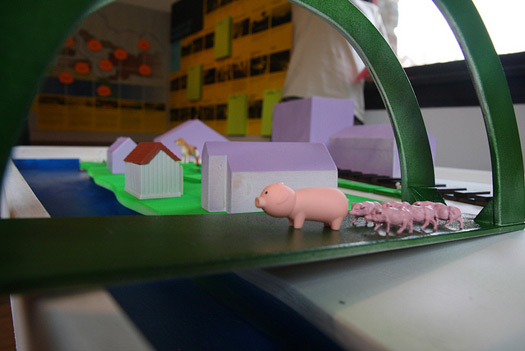
Exhibition model of the site with an emphasis on the agrarian.
In recent years the Town of Brattleboro sought to reconnect with the waterfront. It assembled the site along the river by acquiring parcels over time, and planning studies have explored various long-term development scenarios. But this year, with three buildings on the site set to be demolished as part of a larger transportation plan, and the area nearest the water seeded for grass, the riverfront will finally be opened up to the public, raising the question of how the town might use it.
That’s where the CCS workshop came in. Michael Singer and Charlie Cannon, a professor at the Rhode Island School of Design and principal of LOCAL Architecture Research Design, had worked with Marlboro College to form the CCS in 2006 in the belief that when professionals from a range of disciplines work together they can come up with fresh approaches to community challenges. CCS’s workshop in Brattleboro tested out this premise, exploring short-term programming options for the waterfront site.
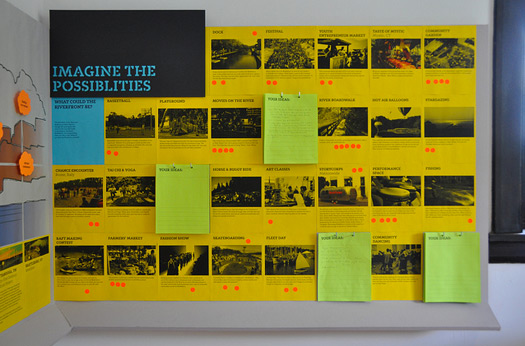
In recent years the Town of Brattleboro sought to reconnect with the waterfront. It assembled the site along the river by acquiring parcels over time, and planning studies have explored various long-term development scenarios. But this year, with three buildings on the site set to be demolished as part of a larger transportation plan, and the area nearest the water seeded for grass, the riverfront will finally be opened up to the public, raising the question of how the town might use it.
That’s where the CCS workshop came in. Michael Singer and Charlie Cannon, a professor at the Rhode Island School of Design and principal of LOCAL Architecture Research Design, had worked with Marlboro College to form the CCS in 2006 in the belief that when professionals from a range of disciplines work together they can come up with fresh approaches to community challenges. CCS’s workshop in Brattleboro tested out this premise, exploring short-term programming options for the waterfront site.

Community input takes the forms of adhesive dots stuck to favored projects and written proposals.
Graphic designers, artists, architects, a sociologist and a planner were members of the CCS workshop. Over nine jam-packed days beginning in mid-July, the participants arrived in Brattleboro and got their bearings in town; familiarized themselves with plans for the vicinity of the site (a nearby bridge project, for instance, as well as the installation of traffic signals at an intersection known locally as “Malfunction Junction”); interviewed local groups about their needs; brainstormed potential projects for the site that might address those needs; identified projects elsewhere that could serve as models for Brattleboro — then conceived, curated, designed and mounted the interactive exhibition at the museum, which is housed in a 1915 station next to the train tracks. Visitors to the “Renewing the Riverfront” show can see through the windows of the museum gallery to the waterfront site, which is about to become a blank slate. “What should this new place be?” the introductory panel to the interactive exhibition asks.
Townspeople have been attempting to answer that question by weighing in on the programming proposals offered by CCS and pitching ideas of their own. Seven weeks into the exhibition, red-dot stickers smother CCS’s riverside boardwalk proposal, with a proposal for a dock and one for a bike trail next in popularity.
Which, if any, ideas become reality is up to Brattleboro. In a planning study about to be released, Michael Singer Studio suggests that the town form a Back to the River Committee to consider proposals from groups that want to organize programs on the waterfront; this committee could make recommendations to the Brattleboro Selectboard, the town's governing body. Brattleboro has not made any decisions about forming a new committee, according to town manager Barbara Sondag. In an email message, she wrote that “It is good to have people talking about the area and thinking about the possibilities.”
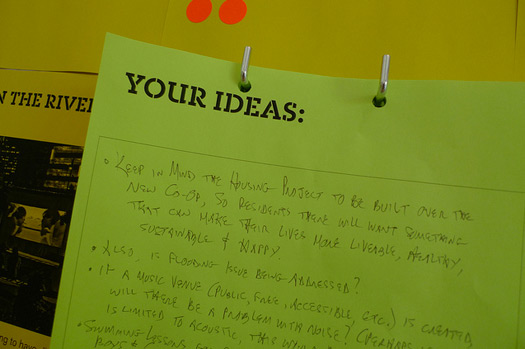
Townspeople have been attempting to answer that question by weighing in on the programming proposals offered by CCS and pitching ideas of their own. Seven weeks into the exhibition, red-dot stickers smother CCS’s riverside boardwalk proposal, with a proposal for a dock and one for a bike trail next in popularity.
Which, if any, ideas become reality is up to Brattleboro. In a planning study about to be released, Michael Singer Studio suggests that the town form a Back to the River Committee to consider proposals from groups that want to organize programs on the waterfront; this committee could make recommendations to the Brattleboro Selectboard, the town's governing body. Brattleboro has not made any decisions about forming a new committee, according to town manager Barbara Sondag. In an email message, she wrote that “It is good to have people talking about the area and thinking about the possibilities.”

One resident's suggestions.
Singer, Cannon and team were gratified at the level of excitement and engagement shown by townspeople during the visioning process, and are now content to fade into the background. Said Cannon: “If at the end of the day we have helped to identify a galvanizing vision that has momentum behind it, we will have achieved at least part of what we hoped for.”
“Renewing the Riverfront” is on view at the Brattleboro Museum & Art Center (in the Union Station building at 10 Vernon St.; 802-257-0124; brattleboromuseum.org) through October 24.
“Renewing the Riverfront” is on view at the Brattleboro Museum & Art Center (in the Union Station building at 10 Vernon St.; 802-257-0124; brattleboromuseum.org) through October 24.

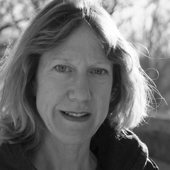
Comments [2]
09.21.10
01:15
09.23.10
09:17